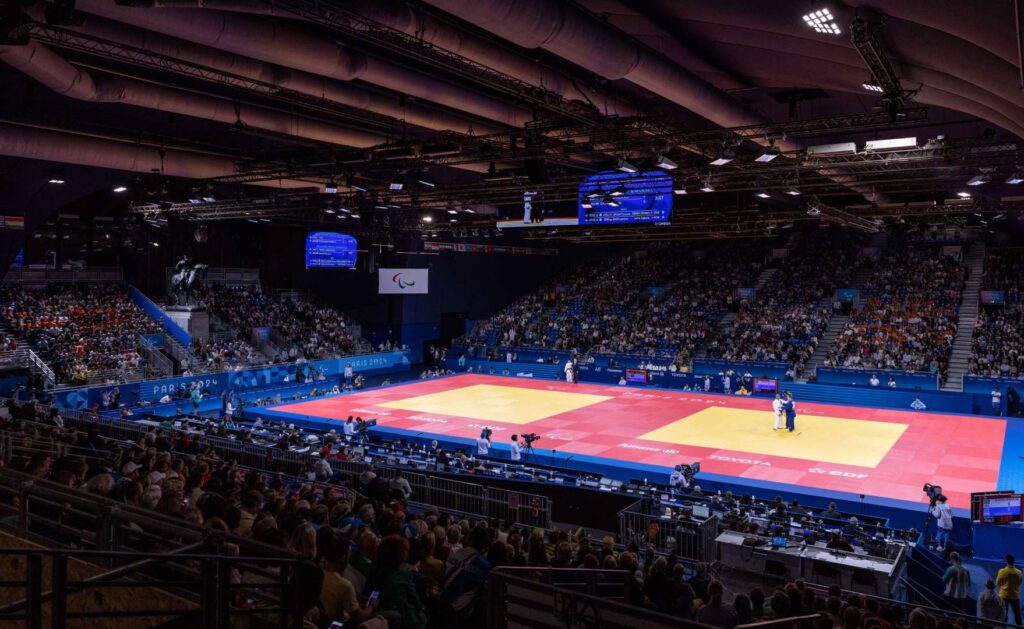News
Small Country Challenge, a new initiative at IBSA Judo
Date: July 7, 2023
Category: Judo
Following the decision of the IPC, a new world began in the life of para judo after the Paralympics in Tokyo. As a result of a long research, Para judo, which had been uniform until then, was divided into two eye classes. (J1 – blind and almost blind judokas and J2 – partially sighted judokas). Consequently, the competitors of the two eye classes compete separately. This system is much fairer than the previous one and gives many more opportunities for “the visually impaired” to participate and achieve medals at the Paralympics.
The IBSA Judo Committee has noticed that a lot of new competitors have appeared. The knowledge of many of them does not yet reach the average. That’s when the idea was born, which is a real innovation, to organize an event (competition and training camp) that supports beginners and developing competitors with comparable skills. The goal is for these competitors to catch up to the front line as soon as possible. And this can only be achieved with cooperation and special tools.
The innovation of the IBSA Judo Committee lies in the fact that it has announced an event that primarily addresses the so-called small countries (judo knowledge and effectiveness). Participation in the event was limited, i.e. a competitor who has a Paralympic or World Championship medal or points, or an athlete from a country with strong judo cannot participate. There was a dual purpose with this event. On the one hand, the judokas should compare their skills in a competition under realistic conditions. (Due to the organization of the competition, each athlete had a minimum of three fights).
Furthermore, in the framework of a three-day training camp, they increase their skills and compete with athletes of similar ability. It is well known that in para judo this is a problem for many small countries. In the training camp, there were two training sessions a day. Half of the training consisted of tachi-waza and ne-waza technical practice, and the other half of the training was randori. Thus, each competitor performed at least 30-40 randori.
Financial support was an essential condition for the event. This was made possible by the cooperation of two IPC grants, an IJF grant, together with IBSA.
The professional organization of the event was assisted by the IBSA Judo Committee.
The event was organized by the NPC of Finland with the professional support of the Finnish Judo Association.
The event was held at the Finnish Olympic and Paralympic Training Complex in Pajulahti, about 120 km from Helsinki. Accommodation and meals met the needs of athletes. The event was organized in a sports hall where the competition could be held on one mat, while the training camp could be held on 3 mats. The sports hall also included a gym.
56 athletes from 19 countries took part in the competition. It was also possible for the new competitors to take part in an eye examination. According to the classifiers’ information, 33 tests were carried out and 2 people failed.
Depending on the number of participants, we have designed the competition management system so that as many fights as possible take place for each athlete. There was double repechage, round robin and merged weight categories (J1 and J2).
Five new countries (IZR, LUX, MNE, UAE, MAR) joined IBSA Judo and about 20 new competitors.
Brazil’s beginner competitors were the most successful with three gold medals, followed by India and Portugal with two gold medals each. Other gold medals were won by: Kazakhstan, South Africa, Hungary and Moldova. 17 countries won medals.
It should also be mentioned that we held a sports forum with the participation of the coaches, where suggestions were made regarding the evaluation of the event, its future implementation, and suggestions regarding the development of judo.
All coaches clearly welcomed the initiative and suggested that it should be regular in the future.
- They also supported the event to include a competition and a training camp. (Those who participate in both events should come and receive support.)
- It should be announced in advance and transparent who can expect support and how much.
- Depending on the quality of the competition, add realistic points to the WRL.
- If possible, organize the competition in a place that is easily and cheaply accessible to the countries (This is a complicated and complex problem – author)
- It would be good if more countries and judokas started.
- The (religious) needs of the countries must be taken into account when preparing the meals.
Suggestions regarding the development of judo:
- Coaches require better information,
- They would like to participate in trainings, (I informed them that the negotiations with the IJF Academy about the formation of the training have started.)
- I would like it if blind and partially sighted judo received more publicity, because they believe that there are blind people (young people) living in many countries who would like to join if they knew about blind judo.
- Continental championships are organized every year, because more beginer competitors are more likely to participate in them.
As chairman of the IBSA Judo Committee, I would like to thank the IPC, IBSA and IJF for their financial support. I would also like to thank the NPC of Finland, Finnish Judo Association, Tikkurila Judo Club and Pajulahti Olympic and Paralympic Training Center for their help in organizing the competition and training camp at a high level.
The management of IBSA Judo considers it a priority goal to support and catch up with new countries and new competitors.
János Tardos
IBSA Judo Chairman
Pajulahti, Finland





